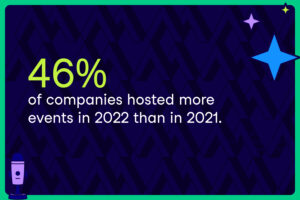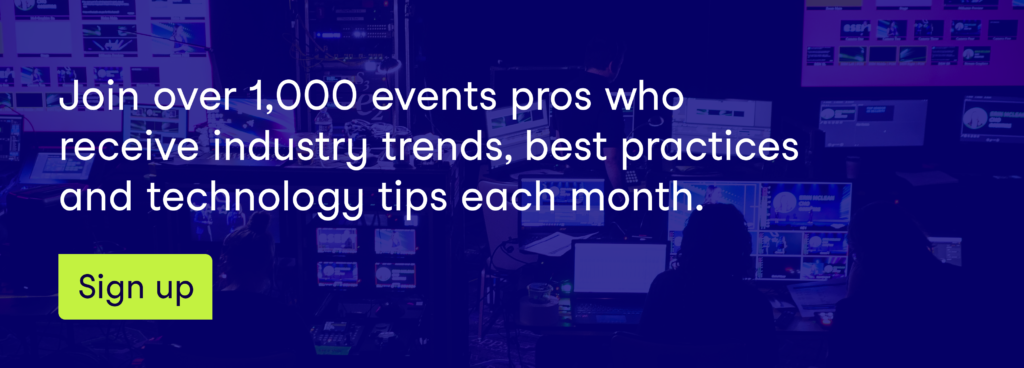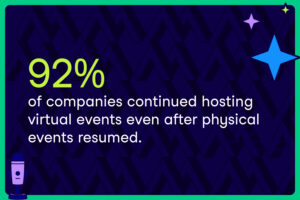Virtual events have become a buzzword in recent years. But if you’ve never done one, they can feel intimidating. What is a virtual event, and how are they different from in-person events? How do you keep audiences engaged when they’re behind a computer screen? And how do you handle virtual event production and live streaming if you don’t have a tech wizard on your team?
With a little support, planning your next virtual event doesn’t have to be a headache. We’re sharing all of the basics to help you understand why virtual events are important, and why they’ve risen in popularity. Let’s jump in.
What is a virtual event?
Virtual events come in many shapes and sizes. From simple Zoom meetings to complex interactive productions, virtual events create a digital experience so that audiences can enjoy events from the comfort of their own home (or wherever they have access to wifi).
For us here at Mainstream, virtual events take lots of different forms depending on the client and their goals. We’ve helped corporate meeting planners produce virtual all-company meetings, supported non-profit organizations with online fundraising events, silent auctions and sponsorships, and live streamed events of all kinds.
It’s important to note that going virtual doesn’t just mean taking your in-person event program and putting it online. Engaging audiences looks a lot different when they’re at home, camera-off and likely distracted with everything else that’s happening around them. So we also spend a lot of time working with our customers to find new and exciting ways to keep our online audiences attentive. DJ sets, photo booths, chatrooms, and trivia questions are just a few of the ways that we’ve driven excitement and energy during recent virtual events.
“I believe there are three reasons people make the decision to attend events. The first is INFORMATION. The second is CONNECTION. The third is the EXPERIENCE.”
— Andrew Roby, virtual event producer and motivational speaker
Virtual events have become more popular recently…
Thanks to a global pandemic, virtual events have become the norm in recent years. From in-person galas and fundraisers to annual company meetings, we’ve taken events online in the name of keeping our audience members and production crew safe.
At first, many were intimidated by the idea of producing an event remotely. Especially if you’ve never done one before, planning a virtual event may feel like throwing spaghetti at the wall to see what sticks. But as our customers can attest, a little help can go a long way:
“Going from live to virtual, we spent a few months being scared of the whole thing. Then we were lucky enough to start working with Mainstream. Now, we’re feeling more confident and calm as we’ve gone through the process of pivoting, and we’re able to keep people engaged and fundraising goals high.”
— Bunny Flanders, Director of Marketing and Communications, The Valerie Fund
If you’re planning more virtual events than you used to and you’re struggling to manage it all, we’ve got your back! Reach out for a free consultation to share your goals and challenges with us.
…but they aren’t all that new
While it may feel like virtual events are a COVID-era trend, they’ve actually been around for a lot longer than you might think. In fact, event expert Tim Kerbavaz argues we’ve been watching virtual events from our couches since the 1950s:
“Virtual events aren’t a new medium at all. We just used to call it ‘television.’ Live-streaming has been around for almost 30 years, and TV for almost 100, and the attributes that make compelling live TV are for the most part the same things that make a compelling online event.”
— Tim Kerbavaz, Technical Producer, Talon Audio Visual
Virtual events aren’t just a stop-gap solution while we’re waiting to return to in-person events. They’re a different medium completely, and a whole new way to engage audiences in ways we just can’t within the confines of a conference room. Of course, it’s always fun to travel to a cool location and hug old friends in person, but there are actually some upsides to hosting events online. We’ve been singing the praises of virtual events for years:
“If you’re not planning on doing a virtual component of your event because you’re worried about Zoom fatigue, you’re missing the point. The fact is, virtual events have been around for a long time — and they open up accessibility for your event.”
— Nick Bacon, Managing Director, Mainstream
Virtual events allow us to reach audiences who couldn’t afford an in-person ticket, or couldn’t make time to travel. It gives us a chance to spread our brand to a broader range of people, and make sure our messages are heard with closed captioning, ASL interpreters and other accessibility features that aren’t always possible at an in-person event.
What does the future of virtual events look like?
As you may have gathered by now, virtual events aren’t going anywhere. In fact, even now that we’re on the other side of a global pandemic, many brands say they’re continuing to prioritize online events:
The fact is, we’ve gotten really good at this whole virtual thing in the past few years, and we’re seeing event planners pay a lot more attention to the details, making their remote festivities more cohesive, engaging, and professional than ever before.
So as we re-enter the world, we’re recognizing a need for hybrid events that include both an in-person and virtual component: to celebrate the fact that we’re able to meet face-to-face again, and acknowledge that we still have a much broader audience to reach on the other side of a computer screen. We need to make sure we’re providing consistent experiences for all audience members no matter how they’re attending.
“Attendees coming to shows today aren’t the same ones that attended in 2019. Many are fatigued, stressed, and unaccustomed to crowds. Some may not yet be ready for large-scale social interaction. [Being] aware of this level of attendee fragility can help us shape spaces and experiences appropriately.”
— Dahlia El Gazzar, Owner, DAHLIA+Agency
We’ve all attended an event virtually where it feels like everyone in person is having way more fun than us. No one wants to be the odd man out, and it’s time for us to create equitable event experiences for all of our attendees.
Ready to start planning your next virtual event?
We’re here for you! Reach out to learn more about how Mainstream can support your virtual event goals from start to finish.





Now that you’ve mentioned it, televised events are basically virtual events. And not everyone is ready to go back to live events, if anything maybe some of them have actually enjoyed attending virtual events and would love to continue doing so